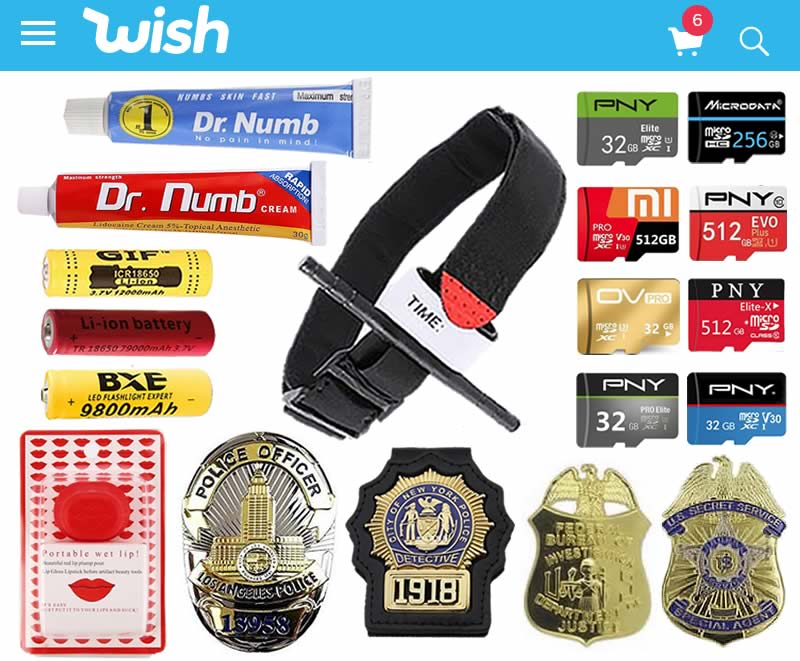Wish.com -- The Risky Counterfeit Marketplace Files To Go Public
Counterfeits, fakes, and scams are all part of Wish.com's marketplace.
October 13, 2020, Los Angeles, CA – Consumers looking to Wish.com may be attracted to its brand-name products offered by China sellers at a fraction of retail. Shipping may take weeks, or over a month for customers who prioritize savings over speed of delivery. However, many items are counterfeit, fake, or replica products, a common issue among major e-commerce sites including Amazon, eBay, and Walmart.
Wish announced it filed a confidential draft to go public with the SEC, a tactic that delays sharing its filings until 15 days before the IPO. Wish is losing about $190 million annually says Forbes, but Wish claims it could be profitable if it stopped spending so much on marketing. A more existential problem: "Lots of the stuff on Wish is trashy, shoddy, even fraudulent," adds Forbes. "There are hundreds of negative reviews for Wish on review sites like Trustpilot and HighYa. Customers are unhappy about unresponsive customer service, merchants who don’t send their orders, and poor-quality goods."
San Francisco's Wish.com is now the third-biggest e-commerce marketplace in the U.S. by sales, claiming some 90 million people globally use it at least once a month. Wish reached 14% of mobile apps in Sept. 2019, according to Statista, compared to Amazon at 80%, Walmart 46%, and eBay 33%.
Particularly alarming is Wish's handling of counterfeit and fraudulent product complaints, including dangerous items that expose consumers to injury or death. One brand-owner wrote of grave concerns about counterfeit versions of their over-the-counter (OTC) anesthetic cream offered on Wish that was dangerous to pregnant women and potentially fatal if containing tetracaine, and not the lidocaine in the authentic product.
The Counterfeit Report, a global award-winning consumer advocate and counterfeit watchdog, investigated and easily found thousands of counterfeit, fraudulent, and replica items on Wish.com, and submitted hundreds of infringement complaints on behalf of, and authorized by, the brand-owners. Wish acknowledged the complaints and replied they "will be reviewed in due course," yet many items remained, some for weeks. While counterfeit sellers and scammers operate 24/7, The Wish Brand Protection Team hours are M-F, 9am-5pm.
Wish's Director of Brand Protection, Maral Behnam-Garcia, offered an ever-changing grab-bag of obstacles and conditions, including Wish's brand-protection application for right-owner's to act as data-entry clerks and fill online forms with their complaints. The Counterfeit Report found that Wish’s system inadequacies did not allow registration, but an upgrade was planned "to launch early next year." Wish's counterfeit enforcement appears to be more obstruction than function, leaving consumers at risk.
Additionally, Wish claims, "Merchants are responsible for providing proof of authorization to sell their authentic, branded products before listing them on Wish," but Wish did not accommodate any of the repeated requests included in each complaint to provide the documentation and counterfeit seller's identity. Some merchants have set up more than 1,000 accounts to evade policing, while others just relisted the same product after removal. It is challenging to assign credibility to Wish's claim when many counterfeit items researched did not even exist in the manufacturer's authentic product line.
Examples of unusual counterfeit and fraudulent items The Counterfeit Report found on Wish.com;

Shown (Images ©The Counterfeit Report);
Websites like Wish, where anyone can sell directly to shoppers, are particularly vulnerable to fakes and fraud. Wish is one of 10 global platforms with the most counterfeits, said Joan Porta, of brand protection company Red Points. That places Wish alongside eBay, Amazon, Facebook, and Instagram. "We find hundreds to thousands of counterfeit listings every week."
Counterfeit and fraudulent item sales are profitable and fund organized crime, terrorism, gangs, and exploit child labor. Interpol states on its website that there is a clear link between the illicit trade of fake or pirated goods and other crimes, including human trafficking, drug trafficking, and money laundering.
America's security, safety, and future are at risk. E-commerce marketplaces are destroying manufacturers, U.S. businesses, and endangering consumers. Adding another online counterfeit marketplace for public investment is not a prudent or safe plan.
While waiting for Congress to act, consumers would be better served to buy directly from the manufacturer, local retailers, or online with the major authorized retailers (Kroger, Costco, Home Depot, Target, Lowes, Best Buy, etc.) who offer consumers competitive purchase options and fast delivery for authentic products. Buyer beware.
 |